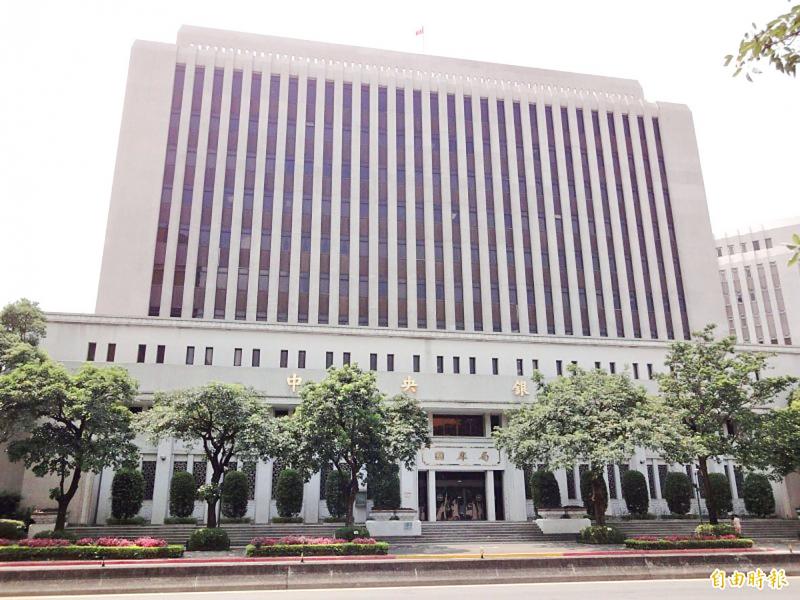Taiwan posted a record balance of payments surplus in the fourth quarter of last year, as the central bank intervened in the local foreign-exchange market to reduce volatility faced by the New Taiwan dollar, the central bank said on Friday.
Last quarter, the central bank registered a US$27.84 billion increase in asset reserves, or balance of payments surplus — a new quarterly high — as the bank sought to slow the appreciation of the NT dollar by buying US dollars.
The nation’s forex reserves repeatedly hit new highs due to the interventions, it said.

Photo: Allen Wu, Taipei Times
Meanwhile, Taiwan recorded an increased current account surplus last quarter, largely due to a strong showing by tech exports on solid global demand for devices used for remote working and online learning amid the COVID-19 pandemic, the bank said.
The current account surplus for the October-to-December period was US$27.33 billion after the merchandise trade surplus expanded to US$23.04 billion last quarter, up US$8.9 billion from a quarter earlier, it said.
Old-economy industries’ exports also picked up in the fourth quarter last year, helping them climb out of a downturn caused by the pandemic, the bank’s data showed.
The current account measures a country’s merchandise and service exports and imports, with a surplus showing that a nation has more exports than imports.
Taiwan’s services account registered a surplus of US$1.38 billion, reversing a US$1.02 billion deficit over the same period a year earlier, and reflecting an increase in freight proceeds and a drop in travel deficit.
The nation had a net fund outflow of US$2.22 billion on the fourth-quarter financial account, which measures the flow of direct investment and portfolio investment, marking the 42nd consecutive quarter of net fund outflows, the bank said.
However, the quarterly net fund outflow fell from US$10.96 billion a year earlier.
Resident direct investment abroad increased US$3.54 billion, while foreign direct investment increased US$3.56 billion, data showed.
Portfolio investments held overseas by Taiwanese interests registered a net increase of US$6.29 billion on the back of a rise in debt securities investments by banks and insurance companies, while portfolio investments by foreigners in Taiwan recorded a net increase of US$4.38 billion, the bank said.
Over the past 42 quarters, Taiwan has had a net fund outflow of US$528.63 billion, which is equivalent to seven years of tax revenue.
Countries with high current account surpluses tend to show net fund outflows, the bank said, citing Germany, Japan, Singapore, South Korea and Thailand, in addition to Taiwan.
Last year as a whole, Taiwan recorded a current account surplus of US$94.28 billion, a new high and a net fund outflow of US$50.04 billion on the financial account, while the central bank’s asset reserves increased by US$48.34 billion.

Taiwan’s rapidly aging population is fueling a sharp increase in homes occupied solely by elderly people, a trend that is reshaping the nation’s housing market and social fabric, real-estate brokers said yesterday. About 850,000 residences were occupied by elderly people in the first quarter, including 655,000 that housed only one resident, the Ministry of the Interior said. The figures have nearly doubled from a decade earlier, Great Home Realty Co (大家房屋) said, as people aged 65 and older now make up 20.8 percent of the population. “The so-called silver tsunami represents more than just a demographic shift — it could fundamentally redefine the

The US government on Wednesday sanctioned more than two dozen companies in China, Turkey and the United Arab Emirates, including offshoots of a US chip firm, accusing the businesses of providing illicit support to Iran’s military or proxies. The US Department of Commerce included two subsidiaries of US-based chip distributor Arrow Electronics Inc (艾睿電子) on its so-called entity list published on the federal register for facilitating purchases by Iran’s proxies of US tech. Arrow spokesman John Hourigan said that the subsidiaries have been operating in full compliance with US export control regulations and his company is discussing with the US Bureau of

Businesses across the global semiconductor supply chain are bracing themselves for disruptions from an escalating trade war, after China imposed curbs on rare earth mineral exports and the US responded with additional tariffs and restrictions on software sales to the Asian nation. China’s restrictions, the most targeted move yet to limit supplies of rare earth materials, represent the first major attempt by Beijing to exercise long-arm jurisdiction over foreign companies to target the semiconductor industry, threatening to stall the chips powering the artificial intelligence (AI) boom. They prompted US President Donald Trump on Friday to announce that he would impose an additional

Pegatron Corp (和碩), a key assembler of Apple Inc’s iPhones, on Thursday reported a 12.3 percent year-on-year decline in revenue for last quarter to NT$257.86 billion (US$8.44 billion), but it expects revenue to improve in the second half on traditional holiday demand. The fourth quarter is usually the peak season for its communications products, a company official said on condition of anonymity. As Apple released its new iPhone 17 series early last month, sales in the communications segment rose sequentially last month, the official said. Shipments to Apple have been stable and in line with earlier expectations, they said. Pegatron shipped 2.4 million notebook